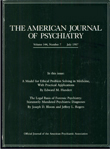Manic Reaction After Induction of Ovulation With Gonadotropins
TO THE EDITOR: We wish to report a case of mania induced by hormone induction of ovulation for the treatment of infertility.
Ms. A, a 34-year-old married woman with no significant psychiatric history or family psychiatric history, was undergoing ovulation induction for secondary infertility. Her obstetric history included two first-trimester spontaneous abortions. After complete evaluation by a gynecologist, she had been diagnosed with secondary infertility and had received clomiphene, with no response. Several months later she embarked on ovulation induction that used urofollitropin and human chorionic gonadotropin. Urofollitropin, a follicle-stimulating hormone (FSH) preparation, was given intramuscularly daily from day 8 to day 12 of the patient's regular 4/24-day menstrual cycle. Estradiol levels were monitored and on day 12 attained the concentration of 2,171 pmol/liter (normal range=110–2,202 pmol/liter), indicating ripe follicles. On days 13 and 14 of her cycle, chorionic gonadotropin, a luteinizing hormone (LH) preparation, was given to induce ovulation.
Approximately midway through the course of ovulation induction, Ms. A experienced a rapid and dramatic heightening in mood. She described feeling “high and energized,” while friends observed that she was inappropriately happy, very talkative, and somewhat bizarre. Ms. A also described symptoms of reduced sleep, racing thoughts, and overactivity. In addition, she became hypersexual and preoccupied with sexual thoughts. She eventually had an extramarital affair with a man she met 1 week after her last hormone injection, and this led to the breakup of her 5-year marriage. After 2 months, the manic symptoms began to subside, and she recovered insight into her uncharacteristic behavior. She subsequently became clinically depressed and was hospitalized with suicidal ideation. She was treated with sertraline, 50 mg/day, with good response.
Given the close temporal relationship of the exposure to reproductive hormone preparations and the development of manic symptoms, and the lack of a premorbid history of mood disorder, we believe that the most likely explanation for this case is a medication-induced manic episode followed by a major depressive episode. The ovulation induction protocol described in this case is commonly used in reproductive medicine. Mood changes have been noted with clomiphene treatment (1–3), but to our knowledge, this is the first report of mania or hypomania induced by FSH and LH preparations. Previous research suggests that the hypothalamic-pituitary-ovarian axis is implicated in mood dysregulation (4). Hypoestrogenism and hypogonadotropic hypogonadism may be associated with depressive symptoms. Conversely, it is possible that elevations of estradiol levels, or gonadotropin administration, may result in elevated mood in susceptible women. Although this patient's estradiol levels reached only the high normal range, the relative increase or rate of increase of estradiol may be important in mood changes, as estradiol has been reported to up-regulate the serotonin transporter (5).
In summary, it is likely that this patient experienced a manic episode induced by therapeutic ovulation induction. Although she had no risk factors for bipolar disorder, it is possible that the mood effects of gonadotropin administration are more marked in susceptible patients. Therefore, it may be prudent to monitor women with bipolar disorder or a family history of bipolar disorder for mood changes occurring during ovulation induction.
1. Blum M, Zacharovitch D, Pery J, Gilerowitch M: Estrogen replacement therapy (ERT) by a special regimen in the years following menopause. Clin Exp Obstet Gynecol 1989; 16:9–11Medline, Google Scholar
2. Kapfhammer HP, Messer T, Hoff P: Psychotic illness during treatment with clomifen. Dtsch Med Wochenschr 1990; 115:936–939Crossref, Medline, Google Scholar
3. Blenner JL: Clomiphene-induced mood swings. J Obstet Gynecol Neonatal Nurs 1991; 20:321–327Crossref, Medline, Google Scholar
4. Toren P, Dor J, Rehavi M, Weizman A: Hypothalamic-pituitary-ovarian axis and mood. Biol Psychiatry 1996; 40:1051–1055Google Scholar
5. Weizman A, Morgenstern H, Rehavi M: Up-regulatory effect of triphasic oral contraceptive on platelet 3H-imipramine binding sites. Psychiatry Res 1988; 23:23–27Crossref, Medline, Google Scholar



